2011年《随堂优化训练》英语 新课标北师大版 必修5 unit 15 warm-up & lesson 4 understanding [配套课件]
文档属性
| 名称 | 2011年《随堂优化训练》英语 新课标北师大版 必修5 unit 15 warm-up & lesson 4 understanding [配套课件] |
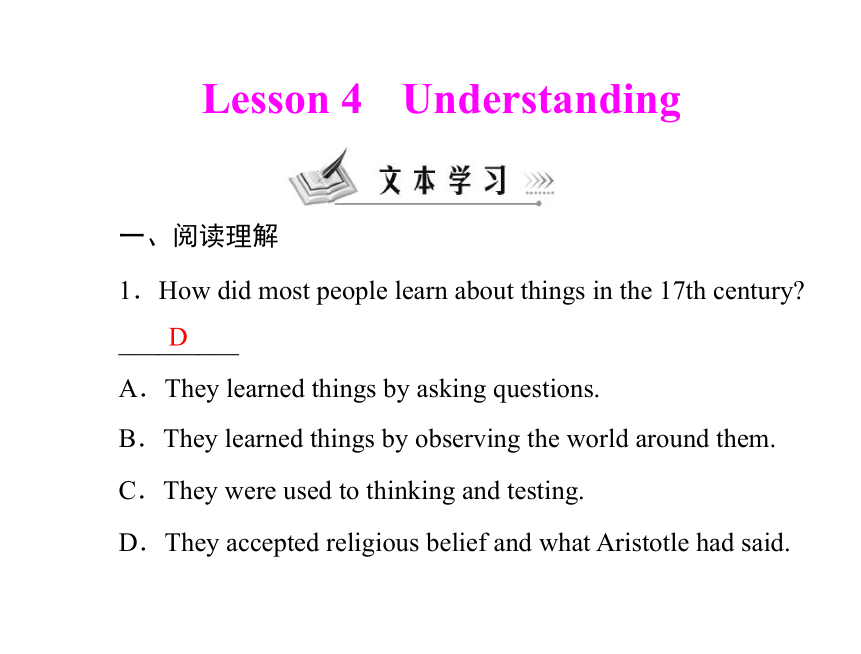
|
|
| 格式 | rar | ||
| 文件大小 | 103.0KB | ||
| 资源类型 | 教案 | ||
| 版本资源 | 北师大版 | ||
| 科目 | 英语 | ||
| 更新时间 | 2011-07-17 00:00:00 | ||
图片预览

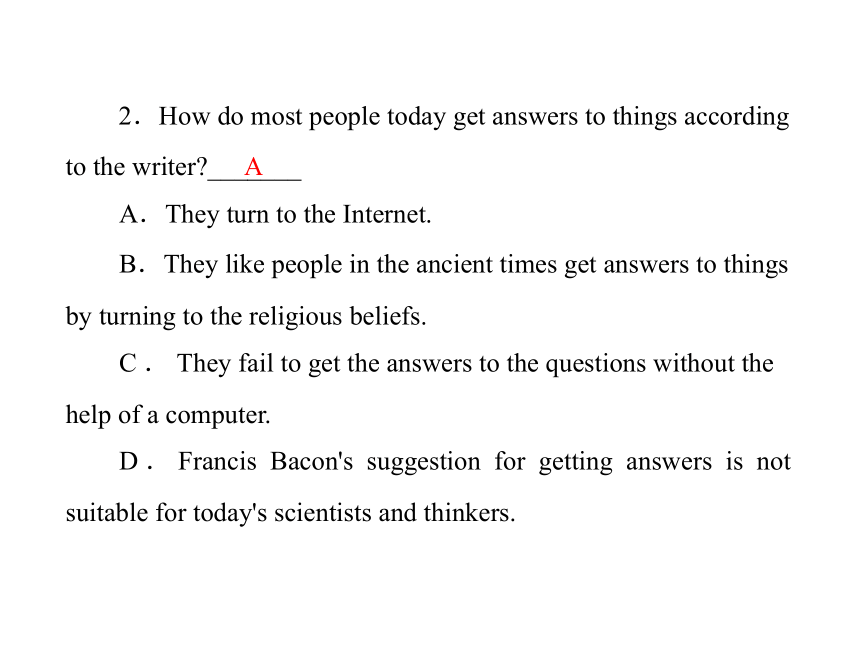
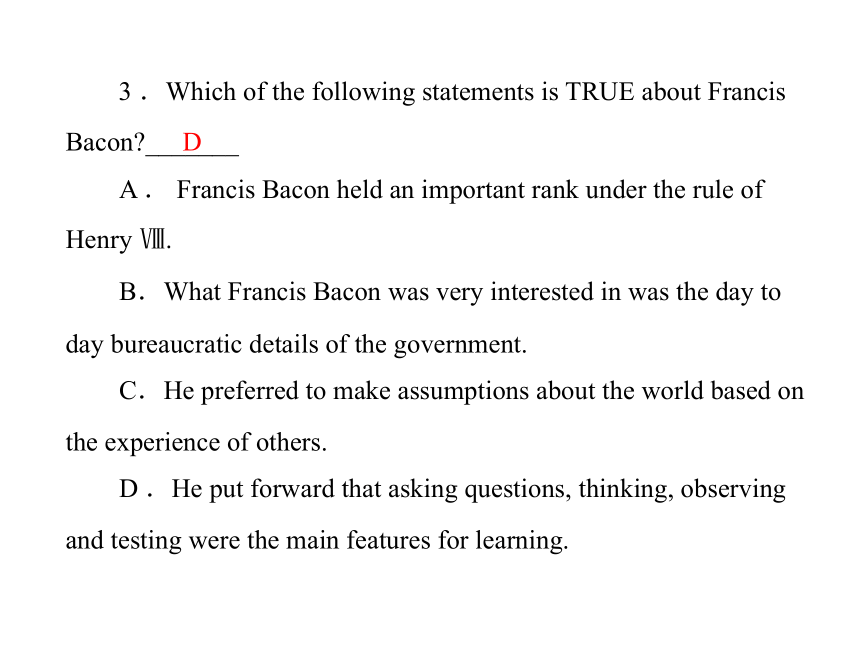
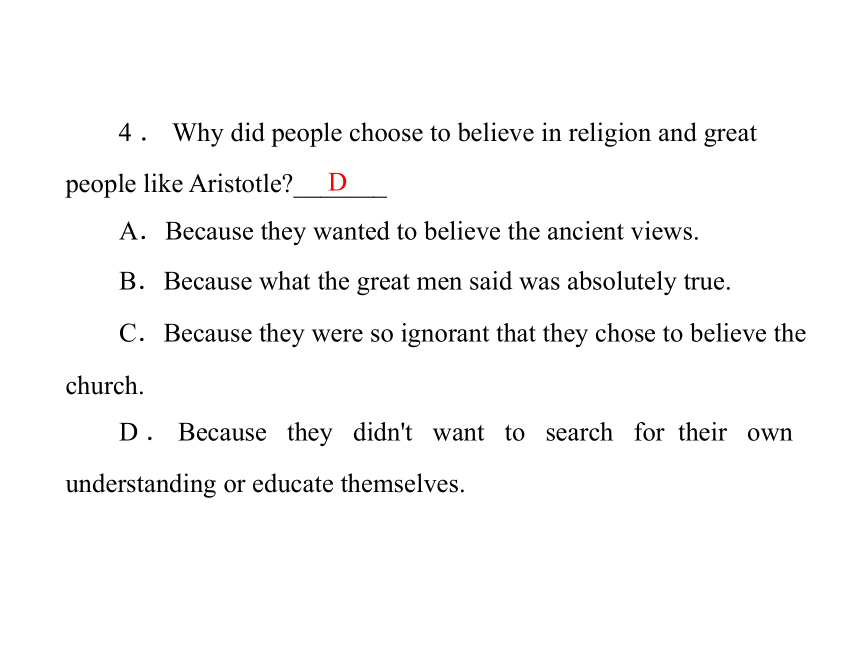
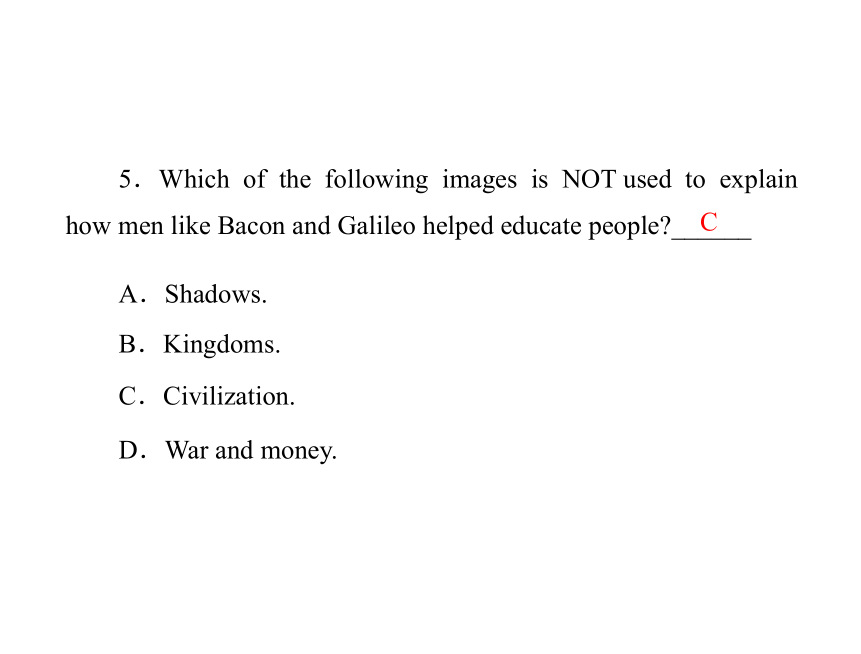
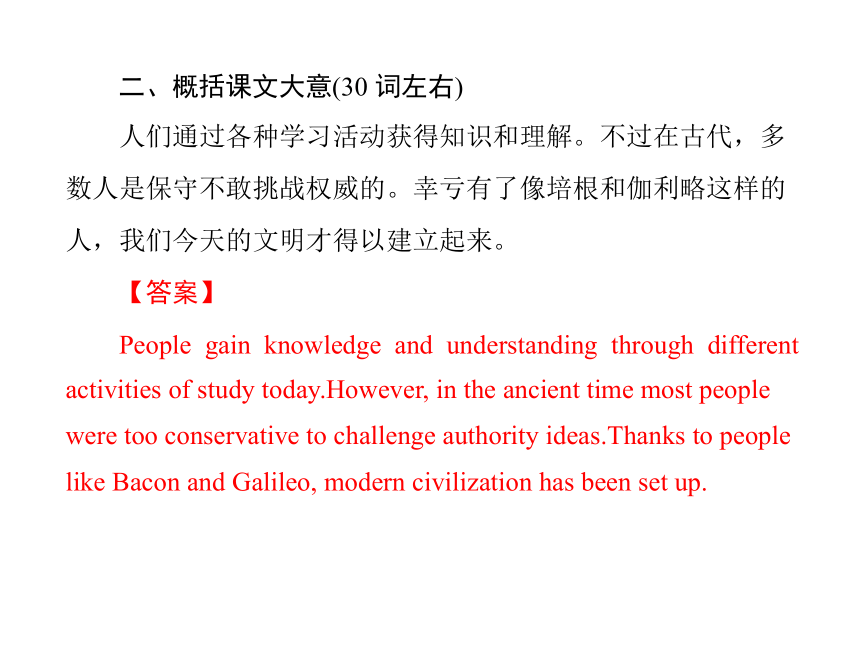
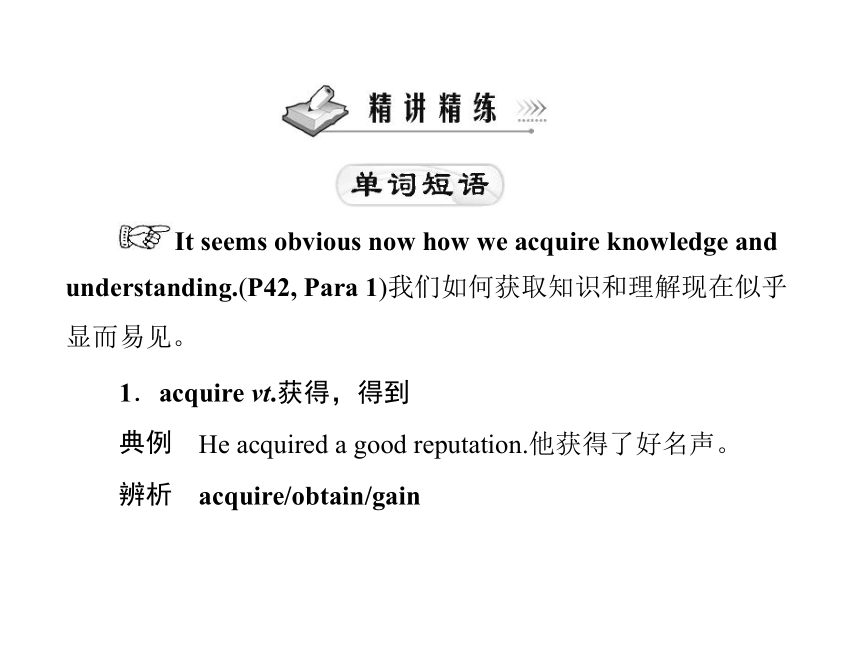
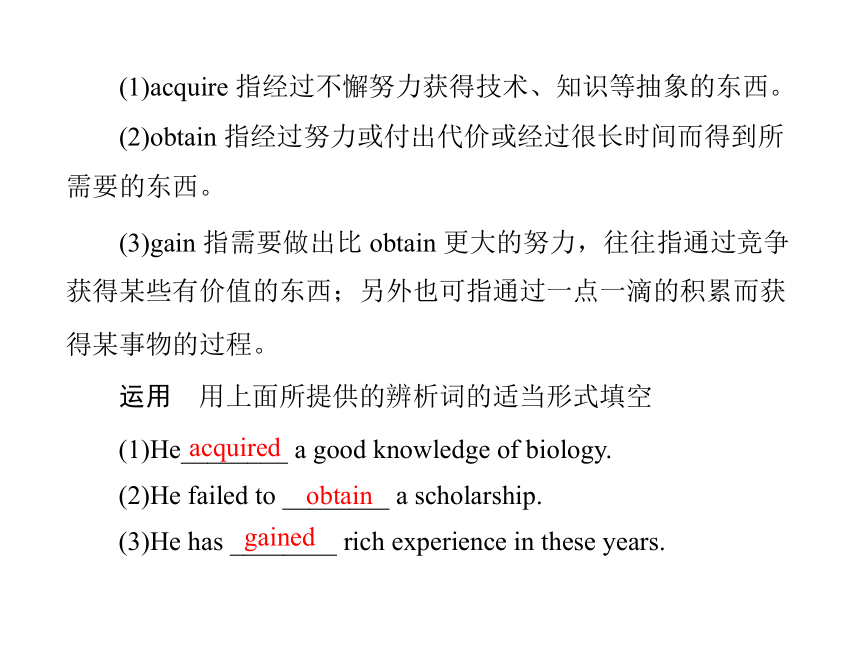

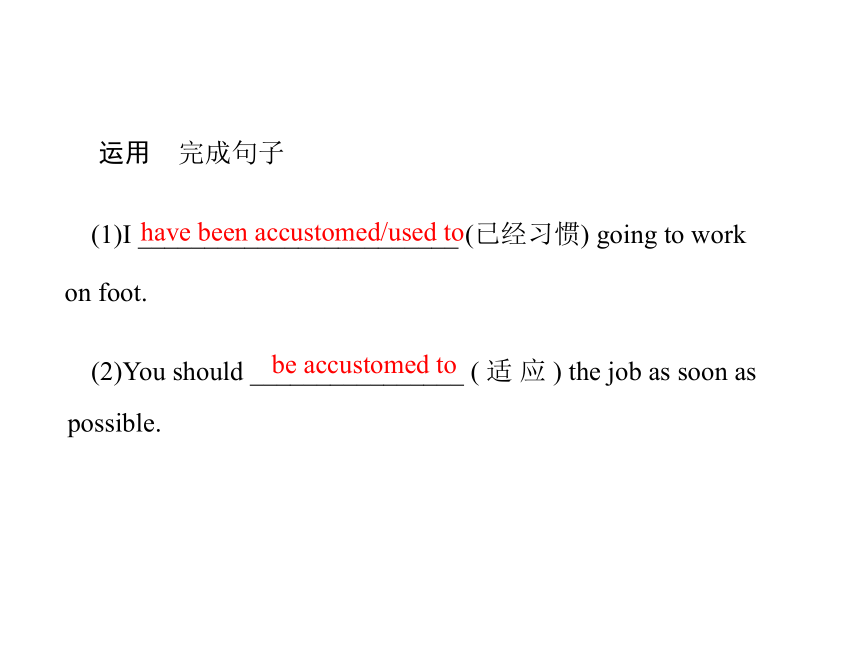
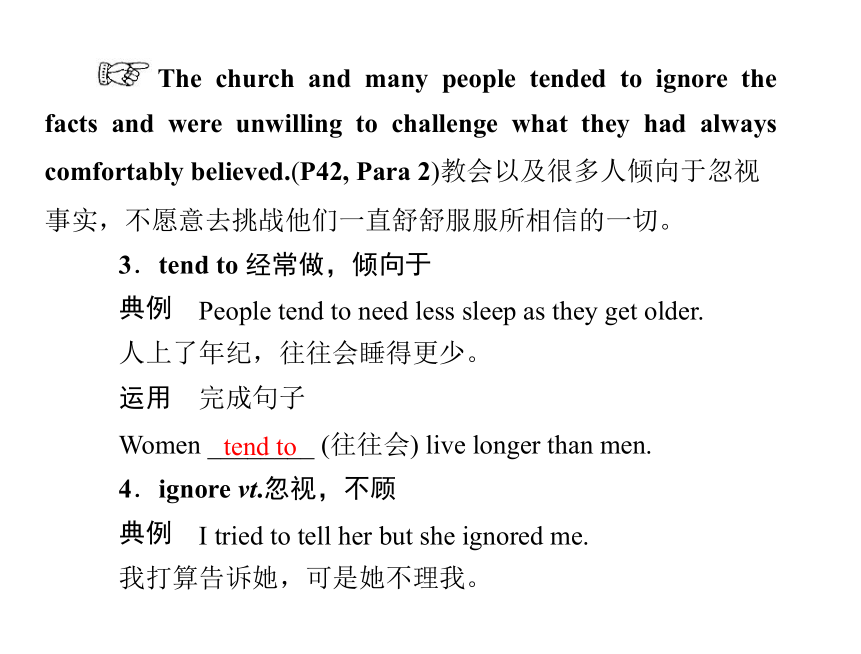
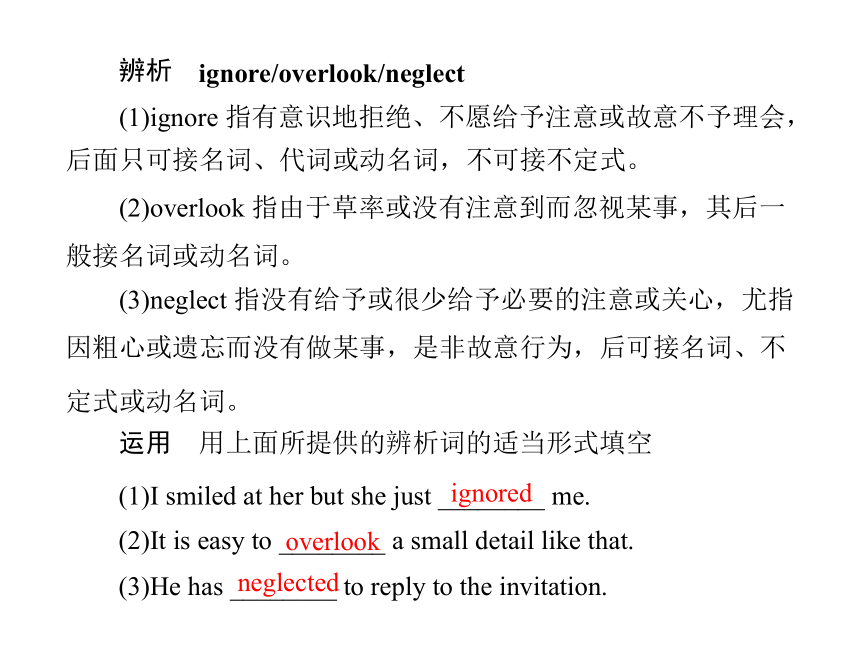
文档简介
(共33张PPT)
Lesson 4
Understanding
一、阅读理解
1.How did most people learn about things in the 17th century
_________
D
A.They learned things by asking questions.
B.They learned things by observing the world around them.
C.They were used to thinking and testing.
D.They accepted religious belief and what Aristotle had said.
2.How do most people today get answers to things according
to the writer _______
A
A.They turn to the Internet.
B.They like people in the ancient times get answers to things
by turning to the religious beliefs.
C . They fail to get the answers to the questions without the
help of a computer.
D . Francis Bacon's suggestion for getting answers is not
suitable for today's scientists and thinkers.
3 .Which of the following statements is TRUE about Francis
Bacon _______
D
A . Francis Bacon held an important rank under the rule of
Henry Ⅷ.
B.What Francis Bacon was very interested in was the day to
day bureaucratic details of the government.
C.He preferred to make assumptions about the world based on
the experience of others.
D .He put forward that asking questions, thinking, observing
and testing were the main features for learning.
4 . Why did people choose to believe in religion and great
people like Aristotle _______
D
A.Because they wanted to believe the ancient views.
B.Because what the great men said was absolutely true.
C.Because they were so ignorant that they chose to believe the
church.
D . Because they didn't want to search for their own
understanding or educate themselves.
5.Which of the following images is NOT used to explain
how men like Bacon and Galileo helped educate people ______
A.Shadows.
B.Kingdoms.
C.Civilization.
D.War and money.
C
二、概括课文大意(30 词左右)
人们通过各种学习活动获得知识和理解。不过在古代,多
数人是保守不敢挑战权威的。幸亏有了像培根和伽利略这样的
人,我们今天的文明才得以建立起来。
【答案】
People gain knowledge and understanding through different
activities of study today.However, in the ancient time most people
were too conservative to challenge authority ideas.Thanks to people
like Bacon and Galileo, modern civilization has been set up.
It seems obvious now how we acquire knowledge and
understanding.(P42, Para 1)我们如何获取知识和理解现在似乎
显而易见。
1.acquire vt.获得,得到
典例
辨析
He acquired a good reputation.他获得了好名声。
acquire/obtain/gain
(1)acquire 指经过不懈努力获得技术、知识等抽象的东西。
(2)obtain 指经过努力或付出代价或经过很长时间而得到所
需要的东西。
(3)gain 指需要做出比 obtain 更大的努力,往往指通过竞争
获得某些有价值的东西;另外也可指通过一点一滴的积累而获
得某事物的过程。
运用
用上面所提供的辨析词的适当形式填空
(1)He________ a good knowledge of biology.
acquired
(2)He failed to ________ a scholarship.
obtain
(3)He has ________ rich experience in these years.
gained
Although today we are more accustomed to typing a
few key words into a search engine...(P42, Para 1)虽然今天我们
更习惯于在一个搜索引擎里打出几个关键词……
2.be accustomed to (doing) sth.习惯于(做)某事
点拨
be/get accustomed to (doing) sth. = be/get used to
(doing) sth.,意为“习惯于(做)某事”。如:
He was a person who was accustomed/used to having 5 hours'
sleep a night.
他是那种习惯每晚只睡五个小时的人。
运用
完成句子
(1)I ________________________ (已经习惯) going to work
on foot.
(2)You should ________________ ( 适 应 ) the job as soon as
possible.
have been accustomed/used to
be accustomed to
3.tend to 经常做,倾向于
典例
People tend to need less sleep as they get older.
人上了年纪,往往会睡得更少。
运用
完成句子
tend to
Women ________ (往往会) live longer than men.
4.ignore vt.忽视,不顾
典例
I tried to tell her but she ignored me.
我打算告诉她,可是她不理我。
The church and many people tended to ignore the
facts and were unwilling to challenge what they had always
comfortably believed.(P42, Para 2)教会以及很多人倾向于忽视
事实,不愿意去挑战他们一直舒舒服服所相信的一切。
(2)overlook 指由于草率或没有注意到而忽视某事,其后一
般接名词或动名词。
(3)neglect 指没有给予或很少给予必要的注意或关心,尤指
因粗心或遗忘而没有做某事,是非故意行为,后可接名词、不
定式或动名词。
运用
用上面所提供的辨析词的适当形式填空
(1)I smiled at her but she just ________ me.
(2)It is easy to ________ a small detail like that.
(3)He has ________ to reply to the invitation.
ignored
overlook
neglected
辨析
ignore/overlook/neglect
(1)ignore 指有意识地拒绝、不愿给予注意或故意不予理会,
后面只可接名词、代词或动名词,不可接不定式。
At first, people approved of his studies and urged him
to continue...(P42, Para 3)一开始,人们赞成他的研究,并力劝
他继续……
5.approve of 赞成,赞许
点拨
approve 在此为不及物动词,后接宾语要带介词 of。
如:
Mother doesn't approve of her idea.
母亲不赞成她的想法。
拓展
approve 还可作及物动词,意为“批准;赞成”。如:
The boss approved his plan.老板批准了他的计划。
运用
完成句子
approved of
(1)None of my relatives_____________ ( 赞成 ) my
marriage.
has approved
(2)The city council________________ (已批准) the new law.
6.urge vt.力劝,强烈要求
n.强烈的欲望;迫切的要求
典例
My friends urged that I (should) apply for the job.
朋友们力劝我申请那份工作。
The vacation is coming and I have an urge to travel.
假期快到了,我很想外出旅行。
拓展
urge sb.to do sth.怂恿/力劝某人做某事
urge that-clause 强烈要求……
urge sth.on/upon sb.向某人强烈要求某事
have an urge to do sth.迫切想做某事
运用
完成句子
(1)She ____________ (催促我) take a rest.
(2)My parents __________ ( 力劝 ) I should study
harder.
(3)When spring comes, I _______________ ( 迫切想 ) be
outside.
urged me to
urged that
have an urge to
...more vital to a man, and more beneficial to mankind,
some might say, than all the money in the world.(P43, Para
5)……一些人可能会说,和全世界所有的金钱相比,(知识和理
解)对一个人更重要,对人类更有益。
7.beneficial adj.有用的,有益的
典例
One or two glasses of wine a day can be beneficial.
每天喝一两杯葡萄酒是有益的。
拓展
be beneficial to 对……有益
benefit from 受益于……
运用
完成句子
is beneficial to
(1)Fresh air ________________ (有益于) our health.
(2)People will ________________ (受益于)
the new invention.
benefit from
本课时单词 拓展词汇 构词法小结
acquire vt.
获得,得到 acquisition n.
习得;学得 1.-tion 和-cy 为名词
后缀,表示“行为,
性质,状态”。如:
civilization 文明;
bankruptcy 破产。
2.-ous、-sive、-al
和-ent 为形容词后
缀,表示“属于……
religion n.宗教 religious adj.
宗教的;虔诚的
defence n.
保卫,保护 defensive adj.
保护的,保卫的
defenceless adj.
无保护的
unwilling adj.
不情愿的 willing adj.情愿的 的,倾向于…的”。
如:anxious
expensive 昂贵的;
beneficial 有用的,
有益的; different
不同的。
3.un-为否定前缀。
如:unnecessary 不
必要的。
4.-less 为否定缀。
assumption n.
假定,假设 assume vt.假定,假设
urge vt.
力劝,强烈要求 urgent adj.紧急的,紧迫
的
urgency n.紧急,紧迫
conventional adj.
传统的,保守的 convention n.习俗,惯例
担忧的;
如:careless 粗心的。
运用
用所给单词的适当形式填空
1.It's ________ (urge), come quick!
2.This is a matter of great ________ (urge).
3.Our parents were very ________ (religion) and very
patriotic.
4.A city without guns or water is ___________ (defence) before
an army.
5.He devotes his time to the _________ (acquire) of
knowledge.
6.He is stubborn and _________ (willing) to take advice.
7.I ________ (assumption) that he had gone for a walk.
8.“Good morning” is a _____________ (convention) greeting.
urgent
urgency
religious
defenceless
acquisition
unwilling
assumed
conventional
1 . It seems obvious now how we acquire knowledge and
understanding.(P42, Para 1)我们如何获取知识和理解现在似乎
显而易见。
点拨
本句中, It 是形式主语,真正的主语是从句“how
we acquire knowledge and understanding”。在英语中,较长的主
语从句可以后置,而用 it 作形式主语。如:
It is not clear yet who should be responsible for this matter.谁
应该为这件事负责还不清楚。
It is said that the serious earthquake may cause about $200
billion in loss in Japan.
据说这次严重的地震可能导致日本损失约 2000 亿美元。
运用
完成句子
(1)________________ ( 必要的) that we should learn English
well.
(2)__________________ ( 据报道 ) no passengers were injured
in the accident.
It is necessary
It is/was reported that
2 . At that time, people believed more in religion than in
facts and people like Galileo Galilei (1564 -1642), who proved
scientific ideas such as “the Earth is not the centre of the
universe” , were often punished by the church with no one
coming to their defense.(P42,Para 2)那时人们更多地相信宗教
而不是事实,像伽利略(1564-1642)这样证明了例如“地球不是
宇宙的中心”等科学观点的人常常会受到教会惩罚,没有人来
保护他们。
点拨
本句是由 and 连接的并列复合句。 前一个分句是简
单句;后一个分句是主从复合句,其中“people like Galileo Galilei
were often punished by...to their defense” 是 主 句 , 主 句 中 含 有
“with+宾语+v.-ing”的结构; “who proved ...the Earth is not
the centre of the universe”是非限制性定语从句, 修饰 people。
拓展
with 构成的常见复合结构如下:
(1)with+名词/代词+现在分词
He looks nervous with everyone staring at him.
每个人都盯着他,他看上去很紧张。
(2)with+名词/代词+过去分词
With her money lost, she was at a loss what to do.
她的钱丢了,她茫然无措,不知道该做什么。
(3)with+名词/代词+副词
The naughty boy stood there before his teacher with his head
down.
这个淘气的男孩低着头站在老师面前。
(4)with+名词/代词+不定式
With you to help us, we will finish the task in time.
有你来帮忙,我们将会及时完成任务。
(5)with+名词/代词+形容词
She walked out in the rain, with her clothes all wet.
她走进雨中,衣服全湿了。
(6)with+名词/代词+介词短语
He sat there thinking, with his chin on his hand.
他手托着下巴,坐在那儿沉思。
运用
完成句子
(1)The student always listens to the teacher____________________
(睁大双眼).
(2)He left his room ________________ (灯开着).
(3)Mary felt shy with the whole class ________________ ( 看
着她).
(4)With the old man ________________ ( 带路), we are sure
to get there on time.
(5)The
thief
sat
in
the
corner,
with
his
hands ________________
(被绑在椅子上).
(6)The teacher entered the classroom with________________
(手里拿着一本书).
with his eyes wide open
with the light on
looking at her
to lead the way
tied to a chair
a book in his hand
3 .It is not surprising that people wanted to believe these
ancient views as they had been put forward by the great
philosopher Aristotle.(P42, Para 3)毫不惊奇,人们愿意相信这些
古老的观点,因为那是伟大的哲学家亚里士多德提出来的。
点拨
“It is not surprising that...”是主语从句,意为“……是
毫不奇怪的”;主语从句中 as 引导原因状语从句。
运用
完成句子
It's not surprising
________________ (毫不奇怪) that nowadays more and more
people like surfing the Net, ________(因为) the Net helps them get
the information (that) they need as quickly as possible.
as
我们要感谢历史上伟人的才智,他们懂得,我们不是什么都懂,
也许永远也不会全懂,如果那样,那将意味着世界上没有问题了。
4 . We need to thank the great men of the past for the
wisdom to know that we don't know it all and probably never
will, for that would mean a world without questions.(P43, Para 2)
点拨
本句中有两个 for, 第二个 for 引导原因状语从句,
其前面部分为主句;主句中的主干部分是“We need to thank the
great men for the wisdom to know that...”,其中不定式作后置定语
修饰 wisdom, that 引导宾语从句。 英语中,for 引导的原因状
语从句并不说明主句行为发生的直接原因, 只提供一些辅助性
的补充说明,从句只能放于主句之后并且必须用逗号将其与主
句隔开。 如:
He could not have seen me, for I was not there.
他不可能见过我,因为我不在那里。
运用
完成句子
for she is late again
She must get up late, ________________ (因为她又迟到了).
1.精彩文段采撷
It seems obvious now how we acquire knowledge and
understanding.To start with, you need questions.Then, to find
answers, you observe the world around you and study the
facts.After that you consider possible answers and test each to find
the right ones.Although today we are more accustomed to typing a
few key words into a search engine and waiting for the Internet to
spit the answer out for us, modern scientists and thinkers are still
solving the world's problems with this type of analysis—luckily for
us.
我们如何获取知识和理解现在似乎显而易见。开始时,你
需要问题。然后,为了找到答案,你观察自己周围的世界,并
且一一加以测试来找出正确的答案。虽然今天我们更习惯于在
一个搜索引擎里打出几个关键词,然后等待互联网为我们吐出
答案,现代的科学家和思想家们仍然在用这种分析方法来解决
世界的问题——这对我们来说很幸运。
2.解析
主题句:It seems obvious now how we acquire knowledge and
understanding.
拓展句 1:To start with, you need questions.(说明主题句)
拓展句 2:Then, to find answers, you observe the world around
you and study the facts.(说明主题句)
拓展句 3 :After that you consider possible answers and test
each to find the right ones.(说明主题句)
次 要 拓 展 句 : Although today we are more accustomed to
typing a few key words into a search engine and waiting for the
Internet to spit the answer out for us, modern scientists and thinkers
are still solving the world's problems with this type of
analysis—luckily for us.(进一步说明拓展句)
3.仿写
原作文材料
主题句:学生考试作弊的原因。
拓展句 1:考试偏多、偏难。
拓展句 2:学生学习不用功、懒惰。
拓展
主题句:学生考试作弊的原因。
拓展句 1:考试偏多、偏难,(次要拓展句)想取悦父母、老
师。
拓展句 2:学生学习不用功、懒惰,(次要拓展句)考试作弊
导致学习上更加懒惰。
【参考范文】
It is known to us all that there are several reasons for students
to cheat in examinations at school.Firstly, as students, they often
take examinations at school, but sometimes they have too many
exams which are too hard for them.In order to get better exam
results to please their parents and teachers, they take risks to cheat
in the exams.Secondly, instead of working hard to achieve their aim,
they idle their time away.So when taking exams, they sometimes
cheat, which leads to their further laziness in study.
Lesson 4
Understanding
一、阅读理解
1.How did most people learn about things in the 17th century
_________
D
A.They learned things by asking questions.
B.They learned things by observing the world around them.
C.They were used to thinking and testing.
D.They accepted religious belief and what Aristotle had said.
2.How do most people today get answers to things according
to the writer _______
A
A.They turn to the Internet.
B.They like people in the ancient times get answers to things
by turning to the religious beliefs.
C . They fail to get the answers to the questions without the
help of a computer.
D . Francis Bacon's suggestion for getting answers is not
suitable for today's scientists and thinkers.
3 .Which of the following statements is TRUE about Francis
Bacon _______
D
A . Francis Bacon held an important rank under the rule of
Henry Ⅷ.
B.What Francis Bacon was very interested in was the day to
day bureaucratic details of the government.
C.He preferred to make assumptions about the world based on
the experience of others.
D .He put forward that asking questions, thinking, observing
and testing were the main features for learning.
4 . Why did people choose to believe in religion and great
people like Aristotle _______
D
A.Because they wanted to believe the ancient views.
B.Because what the great men said was absolutely true.
C.Because they were so ignorant that they chose to believe the
church.
D . Because they didn't want to search for their own
understanding or educate themselves.
5.Which of the following images is NOT used to explain
how men like Bacon and Galileo helped educate people ______
A.Shadows.
B.Kingdoms.
C.Civilization.
D.War and money.
C
二、概括课文大意(30 词左右)
人们通过各种学习活动获得知识和理解。不过在古代,多
数人是保守不敢挑战权威的。幸亏有了像培根和伽利略这样的
人,我们今天的文明才得以建立起来。
【答案】
People gain knowledge and understanding through different
activities of study today.However, in the ancient time most people
were too conservative to challenge authority ideas.Thanks to people
like Bacon and Galileo, modern civilization has been set up.
It seems obvious now how we acquire knowledge and
understanding.(P42, Para 1)我们如何获取知识和理解现在似乎
显而易见。
1.acquire vt.获得,得到
典例
辨析
He acquired a good reputation.他获得了好名声。
acquire/obtain/gain
(1)acquire 指经过不懈努力获得技术、知识等抽象的东西。
(2)obtain 指经过努力或付出代价或经过很长时间而得到所
需要的东西。
(3)gain 指需要做出比 obtain 更大的努力,往往指通过竞争
获得某些有价值的东西;另外也可指通过一点一滴的积累而获
得某事物的过程。
运用
用上面所提供的辨析词的适当形式填空
(1)He________ a good knowledge of biology.
acquired
(2)He failed to ________ a scholarship.
obtain
(3)He has ________ rich experience in these years.
gained
Although today we are more accustomed to typing a
few key words into a search engine...(P42, Para 1)虽然今天我们
更习惯于在一个搜索引擎里打出几个关键词……
2.be accustomed to (doing) sth.习惯于(做)某事
点拨
be/get accustomed to (doing) sth. = be/get used to
(doing) sth.,意为“习惯于(做)某事”。如:
He was a person who was accustomed/used to having 5 hours'
sleep a night.
他是那种习惯每晚只睡五个小时的人。
运用
完成句子
(1)I ________________________ (已经习惯) going to work
on foot.
(2)You should ________________ ( 适 应 ) the job as soon as
possible.
have been accustomed/used to
be accustomed to
3.tend to 经常做,倾向于
典例
People tend to need less sleep as they get older.
人上了年纪,往往会睡得更少。
运用
完成句子
tend to
Women ________ (往往会) live longer than men.
4.ignore vt.忽视,不顾
典例
I tried to tell her but she ignored me.
我打算告诉她,可是她不理我。
The church and many people tended to ignore the
facts and were unwilling to challenge what they had always
comfortably believed.(P42, Para 2)教会以及很多人倾向于忽视
事实,不愿意去挑战他们一直舒舒服服所相信的一切。
(2)overlook 指由于草率或没有注意到而忽视某事,其后一
般接名词或动名词。
(3)neglect 指没有给予或很少给予必要的注意或关心,尤指
因粗心或遗忘而没有做某事,是非故意行为,后可接名词、不
定式或动名词。
运用
用上面所提供的辨析词的适当形式填空
(1)I smiled at her but she just ________ me.
(2)It is easy to ________ a small detail like that.
(3)He has ________ to reply to the invitation.
ignored
overlook
neglected
辨析
ignore/overlook/neglect
(1)ignore 指有意识地拒绝、不愿给予注意或故意不予理会,
后面只可接名词、代词或动名词,不可接不定式。
At first, people approved of his studies and urged him
to continue...(P42, Para 3)一开始,人们赞成他的研究,并力劝
他继续……
5.approve of 赞成,赞许
点拨
approve 在此为不及物动词,后接宾语要带介词 of。
如:
Mother doesn't approve of her idea.
母亲不赞成她的想法。
拓展
approve 还可作及物动词,意为“批准;赞成”。如:
The boss approved his plan.老板批准了他的计划。
运用
完成句子
approved of
(1)None of my relatives_____________ ( 赞成 ) my
marriage.
has approved
(2)The city council________________ (已批准) the new law.
6.urge vt.力劝,强烈要求
n.强烈的欲望;迫切的要求
典例
My friends urged that I (should) apply for the job.
朋友们力劝我申请那份工作。
The vacation is coming and I have an urge to travel.
假期快到了,我很想外出旅行。
拓展
urge sb.to do sth.怂恿/力劝某人做某事
urge that-clause 强烈要求……
urge sth.on/upon sb.向某人强烈要求某事
have an urge to do sth.迫切想做某事
运用
完成句子
(1)She ____________ (催促我) take a rest.
(2)My parents __________ ( 力劝 ) I should study
harder.
(3)When spring comes, I _______________ ( 迫切想 ) be
outside.
urged me to
urged that
have an urge to
...more vital to a man, and more beneficial to mankind,
some might say, than all the money in the world.(P43, Para
5)……一些人可能会说,和全世界所有的金钱相比,(知识和理
解)对一个人更重要,对人类更有益。
7.beneficial adj.有用的,有益的
典例
One or two glasses of wine a day can be beneficial.
每天喝一两杯葡萄酒是有益的。
拓展
be beneficial to 对……有益
benefit from 受益于……
运用
完成句子
is beneficial to
(1)Fresh air ________________ (有益于) our health.
(2)People will ________________ (受益于)
the new invention.
benefit from
本课时单词 拓展词汇 构词法小结
acquire vt.
获得,得到 acquisition n.
习得;学得 1.-tion 和-cy 为名词
后缀,表示“行为,
性质,状态”。如:
civilization 文明;
bankruptcy 破产。
2.-ous、-sive、-al
和-ent 为形容词后
缀,表示“属于……
religion n.宗教 religious adj.
宗教的;虔诚的
defence n.
保卫,保护 defensive adj.
保护的,保卫的
defenceless adj.
无保护的
unwilling adj.
不情愿的 willing adj.情愿的 的,倾向于…的”。
如:anxious
expensive 昂贵的;
beneficial 有用的,
有益的; different
不同的。
3.un-为否定前缀。
如:unnecessary 不
必要的。
4.-less 为否定缀。
assumption n.
假定,假设 assume vt.假定,假设
urge vt.
力劝,强烈要求 urgent adj.紧急的,紧迫
的
urgency n.紧急,紧迫
conventional adj.
传统的,保守的 convention n.习俗,惯例
担忧的;
如:careless 粗心的。
运用
用所给单词的适当形式填空
1.It's ________ (urge), come quick!
2.This is a matter of great ________ (urge).
3.Our parents were very ________ (religion) and very
patriotic.
4.A city without guns or water is ___________ (defence) before
an army.
5.He devotes his time to the _________ (acquire) of
knowledge.
6.He is stubborn and _________ (willing) to take advice.
7.I ________ (assumption) that he had gone for a walk.
8.“Good morning” is a _____________ (convention) greeting.
urgent
urgency
religious
defenceless
acquisition
unwilling
assumed
conventional
1 . It seems obvious now how we acquire knowledge and
understanding.(P42, Para 1)我们如何获取知识和理解现在似乎
显而易见。
点拨
本句中, It 是形式主语,真正的主语是从句“how
we acquire knowledge and understanding”。在英语中,较长的主
语从句可以后置,而用 it 作形式主语。如:
It is not clear yet who should be responsible for this matter.谁
应该为这件事负责还不清楚。
It is said that the serious earthquake may cause about $200
billion in loss in Japan.
据说这次严重的地震可能导致日本损失约 2000 亿美元。
运用
完成句子
(1)________________ ( 必要的) that we should learn English
well.
(2)__________________ ( 据报道 ) no passengers were injured
in the accident.
It is necessary
It is/was reported that
2 . At that time, people believed more in religion than in
facts and people like Galileo Galilei (1564 -1642), who proved
scientific ideas such as “the Earth is not the centre of the
universe” , were often punished by the church with no one
coming to their defense.(P42,Para 2)那时人们更多地相信宗教
而不是事实,像伽利略(1564-1642)这样证明了例如“地球不是
宇宙的中心”等科学观点的人常常会受到教会惩罚,没有人来
保护他们。
点拨
本句是由 and 连接的并列复合句。 前一个分句是简
单句;后一个分句是主从复合句,其中“people like Galileo Galilei
were often punished by...to their defense” 是 主 句 , 主 句 中 含 有
“with+宾语+v.-ing”的结构; “who proved ...the Earth is not
the centre of the universe”是非限制性定语从句, 修饰 people。
拓展
with 构成的常见复合结构如下:
(1)with+名词/代词+现在分词
He looks nervous with everyone staring at him.
每个人都盯着他,他看上去很紧张。
(2)with+名词/代词+过去分词
With her money lost, she was at a loss what to do.
她的钱丢了,她茫然无措,不知道该做什么。
(3)with+名词/代词+副词
The naughty boy stood there before his teacher with his head
down.
这个淘气的男孩低着头站在老师面前。
(4)with+名词/代词+不定式
With you to help us, we will finish the task in time.
有你来帮忙,我们将会及时完成任务。
(5)with+名词/代词+形容词
She walked out in the rain, with her clothes all wet.
她走进雨中,衣服全湿了。
(6)with+名词/代词+介词短语
He sat there thinking, with his chin on his hand.
他手托着下巴,坐在那儿沉思。
运用
完成句子
(1)The student always listens to the teacher____________________
(睁大双眼).
(2)He left his room ________________ (灯开着).
(3)Mary felt shy with the whole class ________________ ( 看
着她).
(4)With the old man ________________ ( 带路), we are sure
to get there on time.
(5)The
thief
sat
in
the
corner,
with
his
hands ________________
(被绑在椅子上).
(6)The teacher entered the classroom with________________
(手里拿着一本书).
with his eyes wide open
with the light on
looking at her
to lead the way
tied to a chair
a book in his hand
3 .It is not surprising that people wanted to believe these
ancient views as they had been put forward by the great
philosopher Aristotle.(P42, Para 3)毫不惊奇,人们愿意相信这些
古老的观点,因为那是伟大的哲学家亚里士多德提出来的。
点拨
“It is not surprising that...”是主语从句,意为“……是
毫不奇怪的”;主语从句中 as 引导原因状语从句。
运用
完成句子
It's not surprising
________________ (毫不奇怪) that nowadays more and more
people like surfing the Net, ________(因为) the Net helps them get
the information (that) they need as quickly as possible.
as
我们要感谢历史上伟人的才智,他们懂得,我们不是什么都懂,
也许永远也不会全懂,如果那样,那将意味着世界上没有问题了。
4 . We need to thank the great men of the past for the
wisdom to know that we don't know it all and probably never
will, for that would mean a world without questions.(P43, Para 2)
点拨
本句中有两个 for, 第二个 for 引导原因状语从句,
其前面部分为主句;主句中的主干部分是“We need to thank the
great men for the wisdom to know that...”,其中不定式作后置定语
修饰 wisdom, that 引导宾语从句。 英语中,for 引导的原因状
语从句并不说明主句行为发生的直接原因, 只提供一些辅助性
的补充说明,从句只能放于主句之后并且必须用逗号将其与主
句隔开。 如:
He could not have seen me, for I was not there.
他不可能见过我,因为我不在那里。
运用
完成句子
for she is late again
She must get up late, ________________ (因为她又迟到了).
1.精彩文段采撷
It seems obvious now how we acquire knowledge and
understanding.To start with, you need questions.Then, to find
answers, you observe the world around you and study the
facts.After that you consider possible answers and test each to find
the right ones.Although today we are more accustomed to typing a
few key words into a search engine and waiting for the Internet to
spit the answer out for us, modern scientists and thinkers are still
solving the world's problems with this type of analysis—luckily for
us.
我们如何获取知识和理解现在似乎显而易见。开始时,你
需要问题。然后,为了找到答案,你观察自己周围的世界,并
且一一加以测试来找出正确的答案。虽然今天我们更习惯于在
一个搜索引擎里打出几个关键词,然后等待互联网为我们吐出
答案,现代的科学家和思想家们仍然在用这种分析方法来解决
世界的问题——这对我们来说很幸运。
2.解析
主题句:It seems obvious now how we acquire knowledge and
understanding.
拓展句 1:To start with, you need questions.(说明主题句)
拓展句 2:Then, to find answers, you observe the world around
you and study the facts.(说明主题句)
拓展句 3 :After that you consider possible answers and test
each to find the right ones.(说明主题句)
次 要 拓 展 句 : Although today we are more accustomed to
typing a few key words into a search engine and waiting for the
Internet to spit the answer out for us, modern scientists and thinkers
are still solving the world's problems with this type of
analysis—luckily for us.(进一步说明拓展句)
3.仿写
原作文材料
主题句:学生考试作弊的原因。
拓展句 1:考试偏多、偏难。
拓展句 2:学生学习不用功、懒惰。
拓展
主题句:学生考试作弊的原因。
拓展句 1:考试偏多、偏难,(次要拓展句)想取悦父母、老
师。
拓展句 2:学生学习不用功、懒惰,(次要拓展句)考试作弊
导致学习上更加懒惰。
【参考范文】
It is known to us all that there are several reasons for students
to cheat in examinations at school.Firstly, as students, they often
take examinations at school, but sometimes they have too many
exams which are too hard for them.In order to get better exam
results to please their parents and teachers, they take risks to cheat
in the exams.Secondly, instead of working hard to achieve their aim,
they idle their time away.So when taking exams, they sometimes
cheat, which leads to their further laziness in study.
